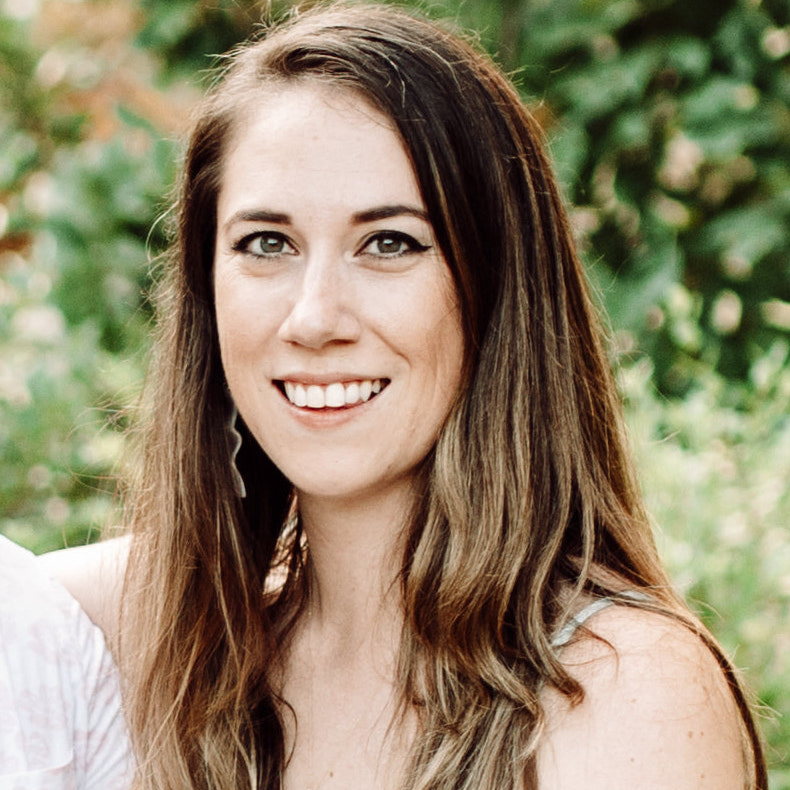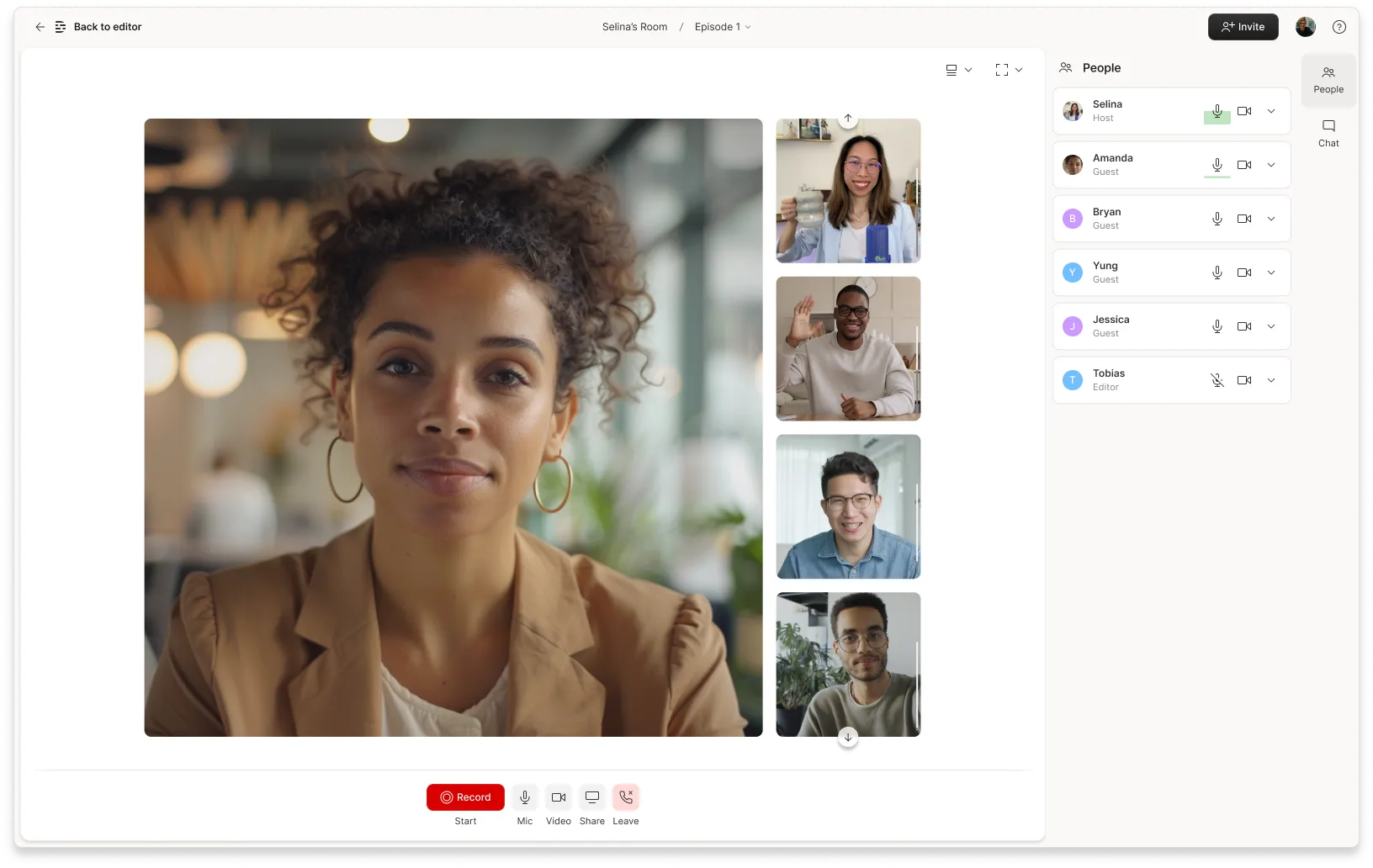Just three years after its founding, Pushkin Industries has become an audio-storytelling powerhouse, with an arsenal of podcasts and audiobooks built around household-name authors like Malcom Gladwell (Revisionist History), Michael Lewis (Against the Rules), and Ibram X. Kendi (Be Antiracist).
Pushkin Producer Lidia Jean Kott and Assistant Producer Eloise Lynton recently joined us for a wide-ranging conversation about how they construct audio stories, the evolution of their workflows, and the future of podcasting.
Read on to learn how:
- The written word drives Pushkin’s audio storytelling
- Pushkin editors collaborate in Descript
- Descript features like automatic transcription and Overdub make life easier for Pushkin editors
- Pushkin producers view the future of podcasting
Working with words
Pushkin takes a literary and journalistic approach to audio storytelling. And with so much content built around accomplished writers, it’s not really surprising that, while the final product is an audio file, the written word remains integral to the process. From scripts to interview transcriptions to archival tape — even to actual books — Pushkin producers spend a lot of time editing text before they ever touch the audio.
Before Descript, Pushkin used a cumbersome process that involved sending interviews audio clips to an outside transcription service, creating a narrative script in a Google Doc, editing that doc, then making the corresponding edits in Pro Tools. Then the editor would make additional changes to the Google Doc, which would have to be synced in Pro Tools — and so on until everyone signed off on the final product.
Now, using a Google Doc as their guide, Pushkin producers edit audio in Descript, which allows them to focus on the content. They don’t export to Pro Tools until they’re finished editing the content.
“It’s like combining two processes we had going separately at the same time,” Lynton said on the livestream.
How Pushkin editors collaborate
The best way to learn about working in Descript is to see how the pros are using it. Pushkin was kind enough to give us a peek at a real Descript session that Kott worked on with Managing Producer Catherine Girardeau for an episode of Against the Rules, in which host Michael Lewis interviews himself.

The grey stricken text indicates sections that are ignored but not deleted, while the dashed vertical lines with an arrow on top show where text has been removed entirely. You can also see a comment from Girardeau on the right, as well as the project folder hierarchy on the left.
Some of the edits are Kott’s, some are Girardeau’s. Typically Kott makes the first round of cuts; the ability to leave comments as they work enables them to collaborate even as they take separate passes at the edits. That includes commenting on cuts they’ve made, which Kott says is particularly important on a podcast like Against the Rules.
“We go through so many versions of the script, especially on a narrative show, that sometimes you need to pull something back in that had been edited out earlier,” she says.
Pushkin’s favorite Descript features
Every editor works differently — and struggles with different parts of the process. Lynton and Kott use Descript’s Automated Transcription and Overdub features to help at some of the stickier points in their workflow.
A big part of Lynton’s job is listening to interviews and searching through archival audio, in search of “those golden moments that will help make the piece come alive.” That used to mean plowing through old transcripts, even watching old movies to find the right clips. “Now that there’s this really fast automated transcription that’s searchable, that just makes that entire process so much easier,” she said. “That has saved me a lot of time.” She also likes being able to import her own transcriptions, and watching Descript match uploaded audio in a matter of seconds. “It’s very fast,” she said.
For Malcom Gladwell’s Revisionist History, the editors sometimes record what they call a scratch mix, where a producer reads Gladwell’s voice to create a rough version of the narrative. Recently they tried what Lynton called ‘robot Malcolm’ — a cloned version of Gladwell’s voice created by Descript’s Overdub. “It’s kind of crazy to hear,” she said. And given that the purpose of a scratch mix is merely for the editor to get a sense whether the story is working, she said, “it’s really great.”
Kott sees Overdub as another potential time saver. “As someone who has gone through sessions and tried to create words just by moving around audio, it’d be helpful to have a robot,” she said.
The future of podcasting
After a decade of explosive growth, the podcast medium…just keeps growing. It’s also changing at a similar pace, and in ways that are tough to predict. Still, we asked Lynton and Kott to take a stab at it.
Kott said she felt optimistic because the listeners just keep coming, and because podcasts are becoming a standard part of so many people’s media habits. As that continues, she predicts the industry will become more professionalized, with larger production crews filled with people who specialize in one or two parts of the process. That means, for example, podcast writers and editors, musical composers, sound engineers, all working in close collaboration — just like in TV or movie production.
“That means there’ll be more jobs and I think the credits will change as well,” she said. “Since podcasting started out so scrappy, you kind of think of the host as the writer, the producer and the engineer. But as it becomes a larger and more lucrative industry, that’s no longer going to be the case.”
Along the same lines, Lynton predicted that listeners would become more attuned to the process that goes into making a well-produced podcast. “My hope is that there will be more appreciation for what goes into the process,” she said.
She also expressed hope that podcasts could help make up for what’s been lost in the decline of newspapers. “Longform journalism has sort of gone away a little bit and podcasts tend to have bigger budgets, which allow people more time to do in-depth pieces,” she said.
Watch the latest webinar
To hear the rest of the conversation, head over to our YouTube channel for the full video.






























